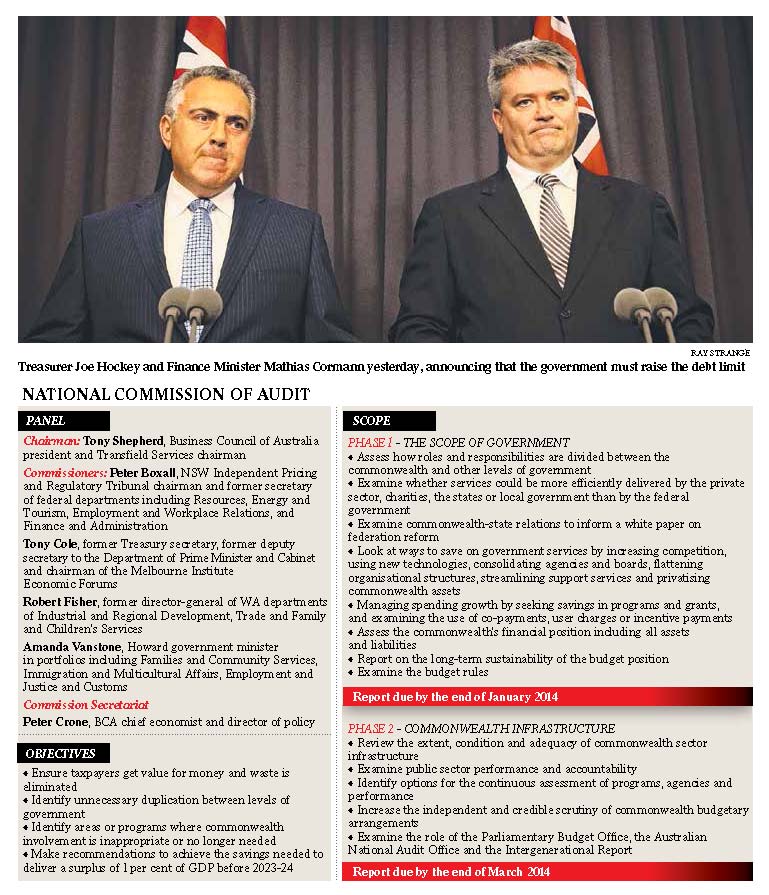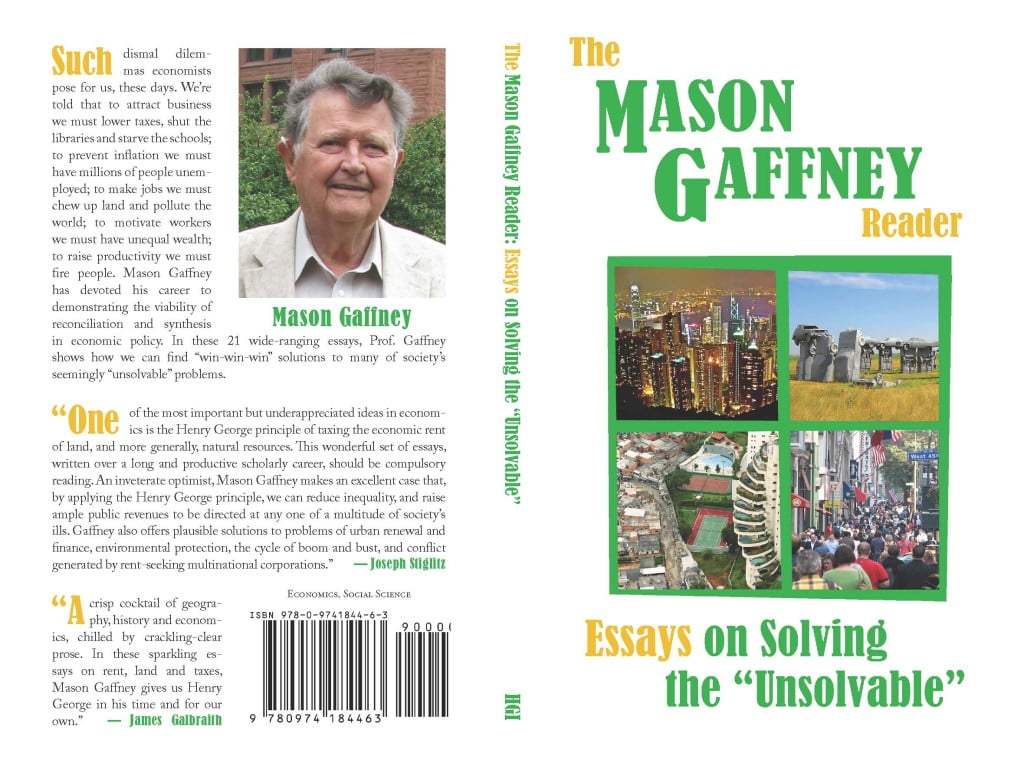LOOK OUT FOR “THE MASON GAFFNEY READER”
Nice article from Steve Keen
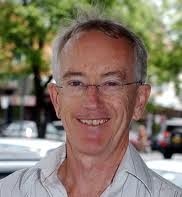 Housing hopes: will the souffle rise twice?
Housing hopes: will the souffle rise twice?
(BTW, don’t forget excessive debt is a proxy for excessive land prices.)
MORE STUPIDITY FROM THE US
There’s a mounting case that the US has lost the plot altogether. Here’s the latest piece of evidence. So it’s those who travel most on roads should pay the most? What arrant nonsense! This is “user pays” drivel carried to the extreme.
Er, guys, so you want to be able to maintain and repair your roads?
Let’s look at it a little more rationally. What would be the value of your property if it didn’t have legal access via a road? Zilch …. Nada …. nothing.
But the value of your land reflects not only that you do have road access, but that you also have proximity to other community amenities and services, right? Not only that, but it reflects the size, shape and topography of your allotment, too?
So, the value of your land accurately reflects what you receive, or take, from the community – and it does it perfectly.
Isn’t that amazing!
Well, for God’s sake strike a rate in the dollar on the value of all the land in the municipality–excluding your buildings!–and pay for road maintenance, and all other municipal costs, on the basis of your proportion of that value. It’s not particularly smart to break up every cost when your land value reflects your rightful share of all municipal (or state, or federal) costs perfectly.
Not user pays, guys …. beneficiary should pay. And that’s all of you, on the basis of the value of your land.
It’s actually the way your forebears used to pay for all their infrastructure, but you’ve since lost the plot.
MELBOURNE AUCTION RESULTS
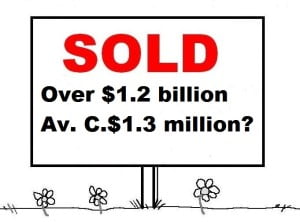 REIV auction results, Saturday 26 October: 932 homes selling of 1246 reported = 76% clearance rate
REIV auction results, Saturday 26 October: 932 homes selling of 1246 reported = 76% clearance rate
But wait a minute, weren’t there 1500 properties up for auction?
So, if all the others were reported, too–and I’m sure they wouldn’t have been properties sold–wouldn’t that make it a 62% clearance rate (932/1500)?
Whatever, people, you need to listen if you don’t want to get burned:
WE NOW LIVE BY “THE LEAD BALLOON RULE”
The Golden Rule “You should treat others as you’d like to be treated” is found in every major religion, so you’d think it was a pretty good philosophy.
But don’t be misled.
Fortunately, a superior philosophy has come to override and replace it. It’s called The Lead Balloon Rule, and it goes like this: “How do I improve my lot at the expense of everyone else.”
The West has come to embrace The Lead Balloon Rule with a fervor unmatched by any religious mindset.
The turnaround came about when switched-on people began to see the hypocritical backsliding on major tenets by the high priests of the great religions, so they joined them with a vengeance:
“The land must be rented, not owned, because you’re only passing through.” (Harrumph!) “Let Caesar have what is Caesar’s”, like the rent of land. (Harrumph!) “The earth is the Lord’s and the fullness thereof. ” Yeah, all those, and Mark 12:1-12 can be allowed to disappear, too.
The philosopher Herbert Spencer backpedalled on his stance from such high-minded error, too, chopping the following out of the next edition of Social Statics, because he graduated to moving around in the same circle as some early Lead Balloonists:
“Equity therefore does not permit property in land.…. Observe now the dilemma to which this leads. Supposing the entire habitable globe to be so inclosed, it follows that if the landowners have a valid right to its surface, all who are not landowners have no right at all to its surface.”
Good one, Herbie: that little omission certainly helped The Lead Balloon replace the Golden Rule!
We’ve come a long way since Herbert Spencer. World financial and tax systems have been faithfully attuned to serve The Lead Balloon Rule which could be paraphrased: “Don’t become part of humanity’s losers who still believe in The Golden Rule, you’ve got to look after yourself – and that can only be done successfully by rent-seeking in the common wealth.”
Common wealth? Yes, the community-generated rent of land and natural resources. But don’t for a moment believe anything is common wealth: that’s clearly communistic!
That reminds me. I must get along to the latest ‘How to invest in property’ seminar. (What’s that bloke on TV’s name again?)
The Lead Balloon–with Barack Obama, David Cameron, Tony Abbott, the neoclassical economists, libertarians and all good supporters of its doctrine aboard–is taking its natural trajectory …….
________________________________________________________
JOE HOCKEY’s VOLTE-FACE: A PAULINE CONVERSION?
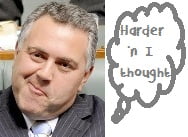 “Headwinds coming out of the US early next year” eh, Joe Hockey? Quelle surprise!
“Headwinds coming out of the US early next year” eh, Joe Hockey? Quelle surprise!
So, you’ll pump up the national debt ceiling by two-thirds, from $300 billion to $500 billion and shunt an extra $8 billion into the RBA? Is this your “budget emergency”?
Would the real Joe Hockey please stand up?
OK, so you’re no longer the Opposition and now you have to face the reality of this depression.
Fine, but don’t simply blame the US for it: the Howard government, the Rudd, government, the Gillard government and the Rudd government (again) have set us up nicely for an enormous collapse of our own.
I mean, about one trillion in our very own property bubble and all that, Joe. Of course, the US situation will indeed make it even worse for us, but my point is that much of our troubles are home-grown.
BTW, just a hint, Joe.
Don’t simply cosy up to the Business Council of Australia and pump up the GST. Even the Grattan Institute is coming to see that’s a no-go. It’ll further exacerbate ineffective demand. You ought to be able to see that.
The only thing that can do it for Australia now is greater land value capture, so you can slash taxes on both people and business – as recommended in The Henry Tax Review–modelled effective by KPMG-Econotec–and shown to be the most efficient revenue base in the 2013 tax report by Price Waterhouse Coopers.
COLLAPSING ECONOMIES
Is this the end of a Kondratieff Wave, signifying another economic depression?
Perhaps a talk I gave on 2 August 2005 at the Institute of Public Policy, Melbourne University, gives context to the current financial collapse that’s missing in mainstream economic analyses.
